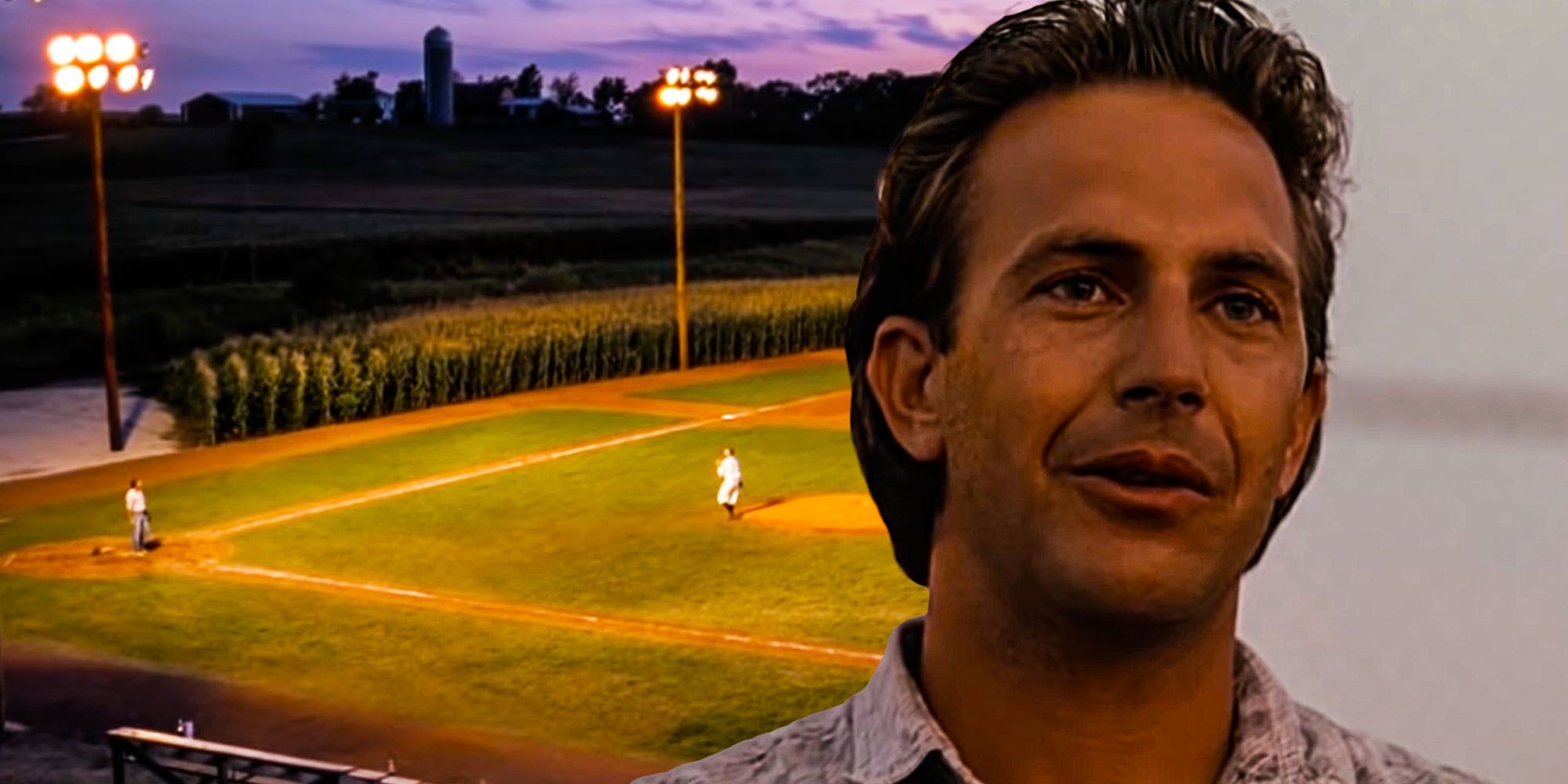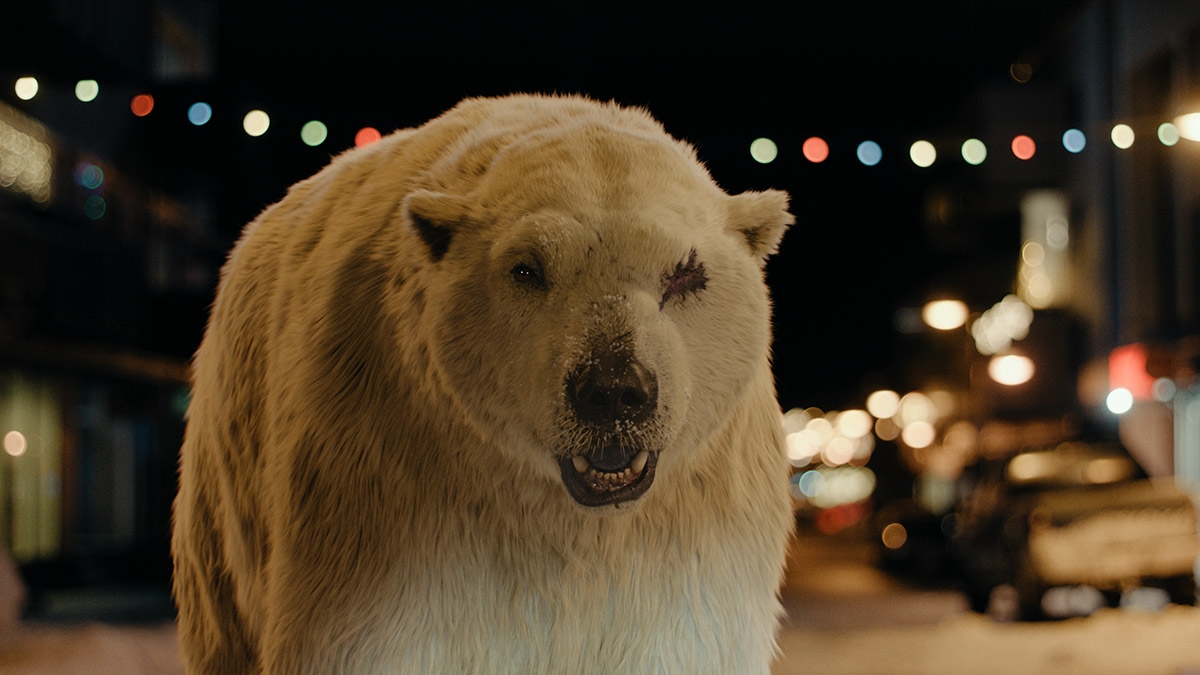As one of the most inspirational movies of all time, Field of Dreams has a lot of different meanings to different people, but Kevin Costner’s film really boils down to a few key themes, so here’s the Field of Dreams ending explained in full. Starring Costner as Ray Kinsella, the 1989 movie follows 36-year-old Ray and his family as he builds a baseball diamond on his Iowa cornfield after hearing voices. The field then draws the ghosts of legendary baseball players who missed out on their dreams in one way or another, allowing Ray to look further into his own regrets.
Lauded as a baseball movie, Field of Dreams has so much more to offer about lost dreams, regrets, and sentimentality for the past – especially in regards to family and one’s passions. As such, Field of Dreams holds a place with movies like It’s a Wonderful Life that boast extremely inspirational messages. At the end of the movie, one feels better about humanity and moving forward with their own doubts in life due to its powerful reconciliations.
Field of Dreams has been confirmed to be adapted into a Peacock TV show written by Parks and Recreation creator Michael Schur, meaning a new generation of audiences will be able to enjoy the optimism of the project’s themes. In reference to the original baseball movie, this is the Field of Dreams ending explained in detail and what the inspirational movie is really about.
What Happens In Field Of Dreams’ Ending
The Field of Dreams ending explained how everyone who came to Ray’s baseball diamond afterlife in Iowa fulfilled their lost dreams. Terence Mann disappears into the cornfield with Shoeless Joe Jackson and the other players, suggesting Mann has also resolved his past regrets. The last player to leave the field is the catcher, who Ray recognizes to be his own father as a young, happy man. Kevin Costner’s character then realizes the field whispering “ease his pain” referred to his own guilt over his torn relationship with his father. John Kinsella is introduced to Ray’s wife and daughter before Ray finally asks him to play catch. Field of Dreams ends by panning from the father and son playing catch to a highway full of traffic where cars have lined up to realize their own dreams at the Iowa cornfield baseball diamond.
Field Of Dreams’ Ending Resolves Generational Issues
What is Field of Dreams about at its core? As James Earl Jones’s character Terence Mann says, “This is the future. You don’t belong here.” At the crux of Field of Dreams’ motifs is trying to resolve how one generation is passed over by the next and understand why they become so angry – they don’t matter, can’t progress, and become relics of the past. Field of Dreams amends generational gaps and unresolved tensions so that life can progress while still having respect for the past.
The sports drama‘s magic is how it has such a comforting sentimentality for past eras that strike up plenty of nostalgia while at the same time attempting to resolve such figures’ inability to progress in the present. As Field of Dreams moves forward with ‘60s counterculture parents stopping neo-fascists from banning books in the present, it also focuses on classic cinema, revolutionary authors of past eras, and America’s favorite pastime. Field of Dreams subtly addresses how people, art, or eras in history that made such a profound impact on culture get left in the past. Classic movie actor Burt Lancaster makes his final film appearance, Annie references Citizen Kane, early 20th-century baseball players get to be young and play the sport they’re passionate about again, Karin watches Jimmy Stewart in Harvey while Field of Dreams itself is essentially a pre-modern Frank Capra film, and a revered, controversial author reconnects with his optimistic fight. Many of these figures never found a life in modern-day society because they became outdated, couldn’t adjust to the times, or stuck themselves in the past due to unrealized goals. Field of Dreams attempts to resolve the issues between older generations that couldn’t properly move past their dreams of the past and gives them a proper send-off.
Field Of Dreams Makes Our Parents Real People
Field of Dreams’ central themes include fatherhood and parent-child issues. Ray Kinsella’s main regret in life is his relationship with his father, who he would antagonize after he constantly pushed him to be great at baseball. When young and naive, it’s difficult to look at one’s own parents as real people with flaws and dreams instead of authority figures and caretakers. Similar to a question in Back to the Future, originally starring Eric Stoltz, Field of Dreams asks what it would be like if one could meet their parents when they were young. When Ray Kinsella finally sees his father as an optimistic young man passionate about baseball who hasn’t been scarred by the trials and tribulations of life yet, he can’t help but interact with him in the way he always dreamed. Ray now gets to experience his father as he truly was while being able to amend their torn relationship by playing catch again. Field of Dreams asks people to look at their parents as real people with dreams when forming overall opinions of their character.
The Ending Relieves Past Regrets To Move Forward
People can’t rest when stuck in the past or on what could’ve been, so Field of Dreams shows how one’s regrets can be resolved to properly move on with life and progress. The White Sox players finally get to play on the diamond again so they move on to heaven; Ray amends his father issues while forgiving him for being a real, flawed human being; Terence’s pain of an effort that couldn’t be achieved is relieved through reconciliation of his own past; “Moonlight” Graham finally gets to hit a ball in a pro game while winking at the pitcher. It’s difficult to progress in life when plagued by the guilt of what was, wasn’t, or could have been, and Field of Dreams allows people to rectify their regrets if they choose to face them. Dances With Wolves star Kevin Costner brilliantly illustrates how Ray could only amend his issues with his father once he agreed to build the baseball field, and Terence could only rediscover his purpose when he decided to go with Ray. “If you build it, he will come” can translate to “if you confront your past, you can change your future.”
Archie “Moonlight” Graham’s story is especially poignant as he has a sweet return home after dedicating his life to helping the masses and finally getting to fulfill his dream come true. His story also wasn’t tragic like the other missed opportunities with Field of Dreams’ characters – Graham enjoyed being a doctor and living a quiet life with his wife.”Moonlight” Graham’s story gives Field of Dreams a plotline from Christmas classic and box office flop, It’s a Wonderful Life, showing that Archie’s life was much more meaningful as a doctor even though he wasn’t able to professionally play baseball. For Graham, he can only realize his baseball dream and move on when he becomes a young man because he only has regrets for his younger self. His baseball career didn’t haunt him into old age as he led a fulfilling life. Archie didn’t need to experience another timeline where he got to hit a ball in an inning, be a major league player, and have his baseball dream come true- he just needed to know that he could have had a great career in order to finally rest.
What Field Of Dreams’ Ending Really Means
“It’ll be just like when they were kids… People will come.” There’s a reason why Disneyland is such a phenomenon; it allows people to be kids again and smile (but instead of cheering on Shoeless Joe Jackson, they cheer on Mickey Mouse and Luke Skywalker). Regardless of who they are, people need to carry this bit of optimism and joy in themselves as they’re surrounded by so many outlying forces that can cause regret. The Field of Dreams symbolizes how people can come back and experience their dreams without being pained with regret and losing sight of themselves. Not everyone’s dreams can come true, but that doesn’t mean people shouldn’t hold onto the hope and joy of when they believed they could. In places like the Field of Dreams, one must believe and let go of realism to enjoy a dream come true or the subtle joys of life.
Is Field Of Dreams A True Story And Does That Matter For The Ending?
Field of Dreams‘ uplifting message begs the hopeful question, as with the likes of other sports dramas such as the beloved Apple TV+ series Ted Lasso, of whether a real person inspired the central story. Unsurprisingly, the supernatural phenomena in Field of Dreams are totally fictionalized, but some of the main characters are based on actual people. The 1989 movie Field of Dreams itself is based on the novel Shoeless Joe by W.P. Kinsella, which features the baseball player of the same name, as well as Archie “Moonlight” Graham. Both Shoeless Joe and Moonlight Graham were MLB players in the early 1900s whose stories were loosely translated into Kinsella’s novel (Graham was indeed a medical doctor, and Shoeless Joe was implicated in the infamous “Black Sox” scandal of the 1919 World Series). The movie, therefore, has a ring of authenticity to it, but the plot and most of the other characters aren’t based on a true story. Ultimately, however, this doesn’t matter for Field of Dreams‘ ending, as the movie’s heartwarming message holds up even without a concrete relationship to real history.
About The Author




























































